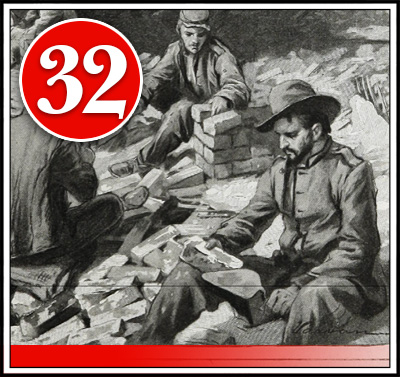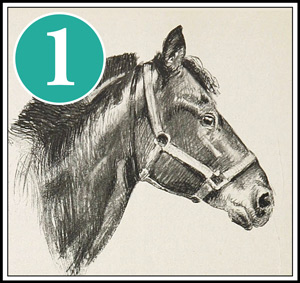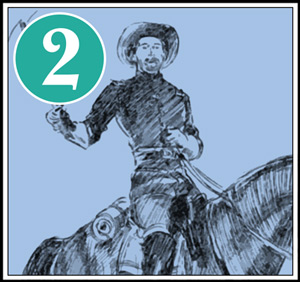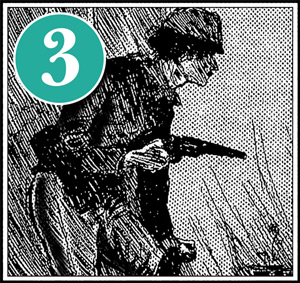
Disbanding the Confederate Army, part 2
Episode 32
The disbanded army faced their hard situation like the brave men they were, and joined patiently in one of the gravest tasks in the history of the world—the Reconstruction of the South.
Podcast: Play in new window | Download
Subscribe: Apple Podcasts | Email | TuneIn | RSS

Disbanding the Confederate Army, part 2
Perhaps nothing could illustrate better the straits to which the planters were put than the following actual experience related to the writer:
In April, 1865, Lawrence Taliaferro, who for four years had been with Lee’s army, returned to his home on the north side of the Rappahannock, perhaps twelve miles from Fredericksburg. He was twenty-five years of age. When he went into the war his father owned a farm of several hundred acres, with handsome buildings, fine stock, and 150 negroes. Lawrence Taliaferro had always lived the life of a son of a country gentleman. Returning to Fredericksburg penniless, he crossed the river and started across country to his old home. Before he had gone a mile he had lost his way. The country, which he had once known as well as one knows the different halls and rooms of his own house, was like a foreign field to him. The forests had disappeared, and where once there had been a single road there were now twenty.
The Army of the Potomac of over 100,000 men had occupied this place almost continuously from November, 1862, until May, 1863. They had cut every tree and sapling for miles in every direction, to get fuel to burn, logs for their huts, and corduroy for their roads.
When Lawrence Taliaferro attempted to get to his old home, he was in a country of which he knew nothing. His way lost, he could only wander from one new road to another, until at last he came upon an unfamiliar hut. He rapped and an old man came out. He was one of his father’s former slaves, and the man conducted him to his old home. All outhouses and fences had disappeared, as well as the shade trees and shrubbery. There was only the shell of the house.
He found his father and sister living there. Two of the old servants had remained, refusing to leave their master. Upon inquiry he found that all that was left of the farm property was one old mule and a much-patched harness. A few days after his return, an older brother came back from Lee’s army and brought with him a worn-out horse.
Then began the struggle for daily bread. The two young men patched up the harness for the mule and horse, borrowed an old plow, and began to prepare the ground for a garden. They had not been at home many days when they learned that a couple of men were in Fredericksburg buying bones.
Now for miles around Fredericksburg the fields were thick with the bones of worn-out mules and horses, which had died during that long period when the country was occupied by Northern and Southern troops.
As soon as the Taliaferros discovered that these bones were salable, they borrowed from a friend the remnant of a wagon and started out to pick them up. As the result of two days’ work they found they had 2,000 pounds, which they sold for two cents a pound.
“I thought my fortune was made, when I got that money,” said Mr. Taliaferro.
From that time on they put in every hour of daylight gathering up bones, while the two old darkies were putting in the garden and preparing the ground for corn. They carried on the bone business for a month, when they made a new discovery. Quantities of old iron were lying on the fields. This they found was salable, and accordingly they went into the junk business. They were much crippled in their work by the fact that their team was so poor that not more than half a day’s work could possibly be gotten out of i t.
This had been going on about a month when a great piece of good fortune fell to them. A wing of the Federal army in marching north passed near their home, and one night the Taliaferros were visited by two Union officers. They had come, they said, to see if old Mr. Taliaferro was living and in good health. It seems that at the time the Union army had been encamped on and around his plantation the old gentleman had become a great favorite with the officers.
The visitors were invited in, and the Taliaferros did their best to get them a good supper. The men were very much pleased with their entertainment, and when they went home, insisted that the boys should go over to the army with their wagon the next day and return their visit. This they did, and when they started to go home, they found that the wagon had been filled with coffee, sugar, bacon, etc. ‘
‘Enough,” said Mr. Taliaferro, “to last six months.”
And not only this: one of the officers went to the quartermaster and said, “See here, aren’t you turning loose every day jaded mules which can’t keep up with the army? Haven’t you now three or four which you know you will soon have to drop out? If so, give them to these men.”
“Well, sir,” said Mr. Taliaferro, “do you know that that man actually brought out four mules and turned them over to us? They were pretty thin and tired, and he rather apologized for them and said, ‘Do you think you can get them home?’ Well, sir. the tears just ran down my face. I said, ‘If they can’t walk I’ll carry them.’ We took them home and turned them out to grass, for grass was one thing we did have. The whole country was green with it, and in two months those mules were fat as butter and able to do a full day’s work.
“The only thing outside of grass which the country afforded was rabbits and birds. They had been left alone for so long a time while the men were away that they were thick, but we did not have powder or bullets, and for some time did not know exactly how to catch them; but we took up so much lead and so many shells on the battlefield, and were saving them all the time, that at last we got powder by unscrewing the caps off the shells and taking it out, and bullets by melting the lead and running it through holes punched in a piece of tin and letting it run into tubs of cold water. After we got this bullet factory started we had plenty of birds and rabbits.
”We got on pretty well that summer. Our garden was good, and we laid up a good deal for winter, but when winter came it was mighty hard to get wood. There was not any left in the country. I don’t know what we would have done if it hadn’t been for the Yankees’ corduroy roads. They were all through our plantation in every direction. We pulled up the pieces, which were, of course, water-soaked, and set them up on end in stacks so they would dry out, and for two winters this is how we got our wood. It took us five years to get our plantation into shape to keep us and the two old men, and after that we began to make money enough to buy groceries and clothes, but it has been hard work.”
It is not strange that there were many, particularly of the better class of Southerners, who felt that such conditions as these they returned to were not to be tolerated, and who at once declared that the last step in their disbandment was to be taken in a foreign land.
“A good many of the young men of the South will go abroad,” wrote Dr. Brodie Herndon, of Richmond, to Captain Maury in May, “and this is one of the gloomiest features of our future.”
Canada, Europe, Brazil were all considered, but Mexico was from the moment of surrender the country in which the greatest number proposed to begin life anew. Indeed for months before the surrender Mexico had been looked upon by the Confederacy as a place of refuge in case of defeat, and it is probable that many leading Confederates had attempted at least to make overtures to Maximilian similar to that in the following letter of General Kirby Smith:
SHREVEPORT, LA., February 1, 1865. The Honorable ROBERT ROSE
Sir:—Whilst in the City of Mexico I desire you, on some fitting occasion, to make known to His Majesty the Emperor that in the case of … the final overthrow of the government which I represent as the military chief of the States west of the Mississippi River, … it is my fixed purpose to leave my native land and seek an asylum in Mexico. Bred to the profession of arms, having such education in my profession as the best military schools in the United States offer, with the benefit of foreign travel and some experience, such as is acquired by the command of armies actively engaged in the field for more than two years, it is my desire to continue in the exercise of my profession.
Having some knowledge of the French and Spanish languages, and having been on duty once on the Mexican frontier, my humble services and such influence as I could exert might be rendered available to His Majesty’s Government. … The national antipathy that would exist in the minds of many citizens of the Confederate States to those of the North, together with their intelligence, endurance, and daring as soldiers, might in contemplation of possible collision between the Imperial Government and the United States of the North, render very desirable such a corps of Southern soldiers as might be induced by the offer of liberal terms to colonize the Empire, and thus greatly strengthen it. Should you find that this offer and the accompanying views are not wholly inappropriate to be attended to, you will please tender my service to the Emperor, and at the same time assure him of my heartfelt wish for the eminent success of his reign, and the honor, welfare, and happiness of his people. I am, very respectfully, your obedient servant, E. KIRBY SMITH, General.
It was towards Mexico, then, that hundreds turned when they found themselves free, and it was there that the only colony of Confederates of any importance was realized. This was founded and conducted by the eminent hydrographer, Captain M. F . Maury. Captain Maury had been sent to England by the Confederate Government in 1862 to perfect his submarine torpedoes. Already his inventions had done great damage to the Federal navy, and Captain Maury hoped to perfect them so that they would do more.
In May, 1865, he sailed for the South, not knowing then of Lee’s surrender. When the news reached him in the West Indies, he considered it unsafe to go back to the United States, and decided to go to Mexico and offer the Emperor his services. He reached Mexico in June of 1865, and was warmly welcomed by the Emperor and Empress. He was offered a position in the Ministry, but declined it, preferring the appointment of Director to the Imperial Observatory. In this position he planned a colony of Confederates in his new home. His idea he explained in a letter to one of his friends:
“In contemplating this shipwreck of country, kinsmen, and friends, I recognized among the debris of the wreck the very materials that are required to build, upon good and solid foundations, the Mexican Empire. Never, since the Revocation of the Edict of Nantes, has such a class of people been found willing to expatriate themselves. From such a wreck Mexico may gather and transfer to her own borders the very intelligence, skill, and labor which made the South what she was in her palmy days—except her bondage.”
Maury’s scheme for a colony of Confederates in Mexico pleased Maximilian. It was at once adopted, and Maury himself appointed Imperial Minister for Colonization.
He succeeded in persuading one of his sons to join him, as well as a number of his friends. By November, 1865, he was writing from the “Office of Colonization” that he was selling lands near Cordova at one dollar an acre, at five years’ credit, as fast as they could be served, and that there were already about forty Southern people there, and that several of the men had sent for their families.
Maury estimated that by the time the land was paid for it would be worth 20, 30, and even 100 an acre, and he gave his friends the most glowing descriptions of coffee growing wild, and fig trees 100 feet high and three feet in circumference, and of luscious pineapples at one cent apiece.
On March 1, 1866, he wrote that two shiploads of immigrants had just arrived, and that everything was going well in the Carlotta Colony. Very soon after this Maury went to England, where his family had been living for some time. Not long after his departure such pressure was brought to bear on Maximilian by his enemies, that the Emperor was obliged to abandon the colonization scheme. The fall of the government which came soon after prevented the plan ever being revived.*
That no larger numbers joined Maury or went into other similar colonies was due partly, no doubt, to the general poverty, but largely to the influence which from the day of his surrender General Lee exerted on the men of the South.
He, like the rest, knew nothing of the course the United States Government would take towards him. His property was gone, and he must start at the bottom again. Whether he would be free or a prisoner he did not know, but he at once announced his determination of abiding by the decision of the government to which he had surrendered, and if allowed to do it to engage in some work which would be useful in restoring the South.
“At the first cessation of hostilities,” he wrote a correspondent, “I considered that the South required her sons more than at any former part of her history to sustain and restore her, that though many might find comfortable homes in a foreign land, what would become of the Southern States and the citizens who abided in them?”
Colonel R. L . Maury, son of Captain Maury, tried to interest General Lee in his father’s project, but the General declined. “I have entertained the opinion that unless prevented by circumstances or necessity, it would be better for them (the people of the South) and the country to remain at their homes and share the fate of their respective States.” And to Captain Maury himself he wrote:
“The thought of abandoning the country and all that must be left in it is abhorrent to my feelings, and I prefer to struggle for its restoration and share its fate rather than to give up all as lost. . . . I shall be sorry if your presence be lost to Virginia; she has now need for all of her sons and can ill afford to spare you.”
To scores of others who sought his advice he wrote in similar vein. Nor was he alone in this attitude. Wade Hampton, when besought to head a colony of emigrants, replied:
“The very fact that our State is passing through so terrible an ordeal as the present should cause her sons to cling the more closely to her. My advice to all of my fellow-citizens is that they should devote their whole energies to the restoration of law and order, the re-establishment of agriculture and commerce, the promotion of education, and the rebuilding of our cities and dwellings which have been laid in ashes.”
Indeed, the majority of the leading men of the South said with Lee and Hampton that their States had never needed them so much, and that they should stand by them. Gradually those who at first had felt that the humiliation and uncertainty of their new position were too great to be endured returned, as did Maury, and lent their aid.
Inspired by these noble examples, the rank and file of the disbanded army faced their hard situation like the brave men they were, and joined patiently in one of the gravest tasks in the history of the world—the Reconstruction of the South.
The story of the self-control of these disbanded men in the situation in which they found themselves when they reached their homes, of their courage, their patience, their effort, forms one of the finest chapters of heroism in the History of the United States.
• • • • • • • • • • • • • • • • • • • • • • • • • • • • • •
By subscribing, you will automatically receive the latest episodes downloaded to your computer or portable device. Select your preferred subscription method above.
To subscribe via a different application: Go to your favorite podcast application or news reader and enter this URL: https://clearwaterpress.com/byline/feed/podcast/



